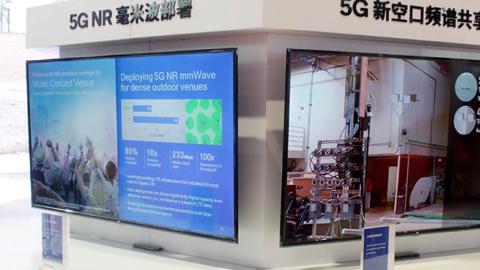An epic battle is brewing over the future of wireless technology, and the future of 5G technology.
On one side is China, which is stopping at nothing to make sure it dominates global telecommunications in the 21st century, by any means fair or foul.
On the other is the United States, which is beginning to wake up to the fact that losing the 5G future to China will be a major catastrophe, not only for the U.S. but for freedom and democracy around the globe.
On November 13, Hudson Institute hosted an "event":https://hicloud.zoevive.workers.dev/events/1625-promoting-american-leadership-in-5-g… describing how China is moving to dominate this advanced wireless technology that promises superfast connections for everything from self-driving cars to the Internet of Things, and how the U.S. needs to halt this Beijing-led high-tech offensive. To date some 64 countries have signed up to use or at least test 5G equipment made by Chinese IT giant Huawei. China is even establishing 5G bridgeheads with some of the US’s closest allies such as Britain, Germany, and Japan.
The day after Thanksgiving the Wall Street Journal announced that the U.S. government was starting to respond to the challenge. According to the Journal:
bq(blockquote). American officials have briefed their government counterparts and telecom executives in friendly countries where Huawei equipment is already in wide use, including Germany, Italy and Japan, about what they see as cybersecurity risks. The U.S. is also considering increasing financial aid for telecommunications development in countries that shun Chinese-made equipment.
The chief worry in Washington is that China will have a whip hand over access to 5G in countries that host American military bases, since much of the traffic used by U.S. military installations will get routed through commercial networks—with the Chinese listening in.
Beyond that, however, everyone should be concerned that China, the country that is weaponizing advanced technologies like AI and smart phones to spy on and dominate their citizens, will be able to control access to the future of global telecommunications, as well.
Some major carriers say Huawei’s broad offering of components, lower costs and government-backed financing (since 2012 Beijing has loaned Huawei some $9 billion for overseas projects like 5G) make the Chinese offer too attractive to refuse. Thanks to China’s all-out 5G blitz, research firm IHS Markit Ltd says two of the world’s top four telecom-equipment market leaders are now Chinese firms, with Huawei leading the pack at 22% of the market and ZTE bringing up the rear at number 4 with 10% (numbers 2 and 3 are Nokia with 13% and Ericsson with 11%, respectively).
Unless the U.S. and its allies start to reverse that trend, it will be nearly impossible to prevent Beijing from treating the World Mobile Congress in Barcelona this coming March as a victory parade for the Chinese Communist Party.
It’s no good assuming that free-market competition can halt China’s momentum. Consistent with its long-established pattern of using cyber theft to get access to the advanced technology it wants, China has been deploying its own bag of dirty tricks to derail competitors in the 5G sweepstakes, including bribery and worse. For example, when a Chinese-backed consortium was bidding for the 5G contract in Mexico, 72 hours before the final bid showdown a rival consortium had its bid boxes high-jacked in broad daylight in the business district of Mexico City.
In another case, the electronic devices of a senior American wireless executive were stolen at a major international conference. When suspicion fell on two Chinese corporate employees, they steadfastly proclaimed their innocence: that is, until surveillance cameras revealed they were indeed the culprits.
Does anyone expect the crime wave will stop once Huawei-built 5G equipment is actually installed? As American officials trying to dissuade foreign governments from using Huawei network components explain, today’s cellular-tower equipment aren’t used much to move a network’s voice and data traffic. With 5G, however, cellular-tower hardware will take over much of this role, which can then be used to launch cyberattacks on those networks.
In short, a Huawei-dominated 5G future has the potential to hand over everyone’s networks to China’s ultimate control. That’s one reason China is willing to win those 5G bids by any means necessary: it understands the global stakes involved.
Now at last America is realizing it too. But far more needs to be done than just warning or scolding our allies like Britain and Germany. According to a recent Deloitte report, China's spending on building 5G since 2015 has exceeded the U.S. by $24 billion. America needs to show the world a better way to build and finance 5G networks, starting here in our domestic market.
But time is running out. Unless the U.S. takes some serious action soon to halt China’s bid for global supremacy in telecommunications, America and its allies will be looking at a dismal future for their freedom and security.

















